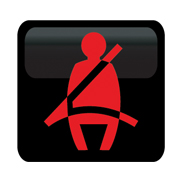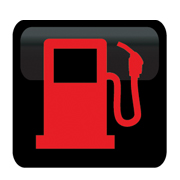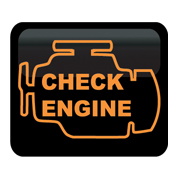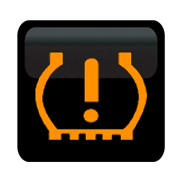I just realized I've been driving automobiles for 25 years. Do the math and I'm either older than you thought or I started driving earlier than you thought. Either way, I may have surprised you. What surprised me, the other day, was my reaction to an illuminated indicator light on my relatively new vehicle. It used to be, vehicles had very view indicators. Of course, there was the analog fuel gauge. I knew how accurate it was by the amount of times I ran out of gas. There was also the check engine light. I think I saw a check engine light once, back in 1986, when I simultaneously saw smoke appearing from under the hood of my 1980 Honda GLC. My point is, back in the day, by the time you saw the indicator light, it was too late. Fast forward to today and I realize I have half a dozen indicator lights and I'm very aware of them.
 |
Seat Belt: This indicator normally lights up if I have not buckled my seat belt. The light is accompanied by a soothing reminder tone. The result is I usually look around to notice if anyone is looking at me. I sheepishly click my seat belt and go on about my business. It happens on rare occasion, much like farting in public. Either way, it's embarrassing and hopefully nobody is around when it happens. |
 |
Low Fuel: This warning normally indicates the car is low on fuel and I should get to the nearest gas station. Fortunately, I also have a digital indicator that tells me how many miles I have left. Regardless of knowing how many miles I have left, having the light appear still creates a certain level of anxiety. I guess it's merely a flashback from my reckless youth when I never seemed to put more than $5 worth of gas in my car at a time. The difference is that used to get me more than 5 gallons of gas, compared to about one gallon now. |
 |
Check Engine: This indicator still frustrates me. I've seen this indicator a few times in the last few years. Each time it was when the car was dead and would not start. It would be nice if it actually gave me some kind of warning. I know the car is dead. If anything, it should be a scull and crossbones. I'm not a car mechanic. Therefore, what good does it do to tell me to check the engine? |
 |
Tire Pressure:As a result of the Check Engine indicator light, I now have a new car. It's full of all kinds of awesome things, like USB, Bluetooth, and a thermometer that tells me how hot or cold it is outside. But, I have a new indicator light that I've never seen before. Well, not before last week. It's a tire pressure monitoring sensors (TPMS) to monitor the air pressure in each of the tires. |
So, here I am writing a post about my car and the indicator lights. What's my point? My point is, the tire pressure indicator illuminated and I nearly got into an accident, trying to get out of traffic and onto the shoulder of the road. I was suddenly concerned about what was wrong. I didn't hear an explosion. The car was not pulling to the left or to the right. My gut was telling me that everything was fine but I've been conditioned into believing these indicator lights. I got out of my car and looked at the tires. All looked fine. I took the car to the dealer and had them check the pressure. All was fine. After a diagnostic test, it was discovered that the sensor was malfunctioning.
Again, what's my point? Do you use metrics or indicators on your project that tell you how things are progressing? Do you think you rely on them too heavily? Could it be you need to trust your gut more and the indicators less? Next time you're measuring your team or project performance against an indicator (or metric), take a moment to kick the proverbial tires. Don't just accept the metric as the truth, the whole truth, and nothing but the truth.
Now if only I could get that guy in front of me to notice he's had his blinker on the last 15 miles.